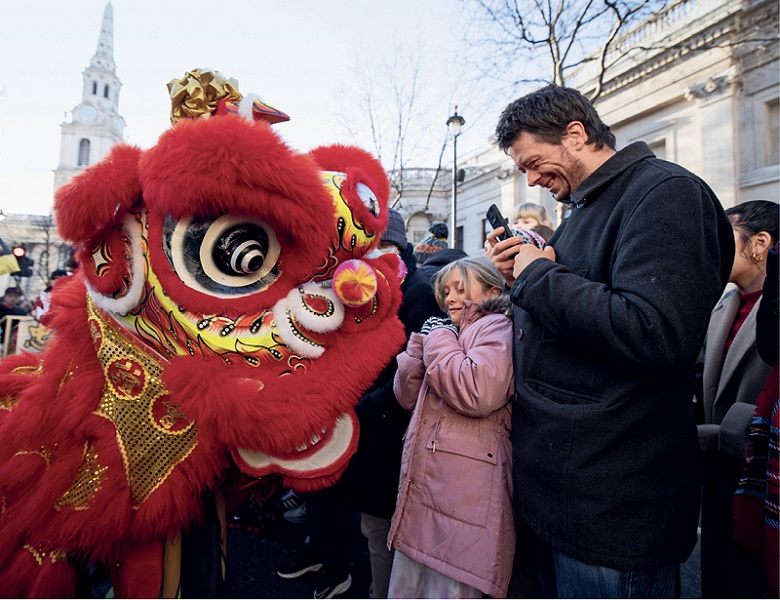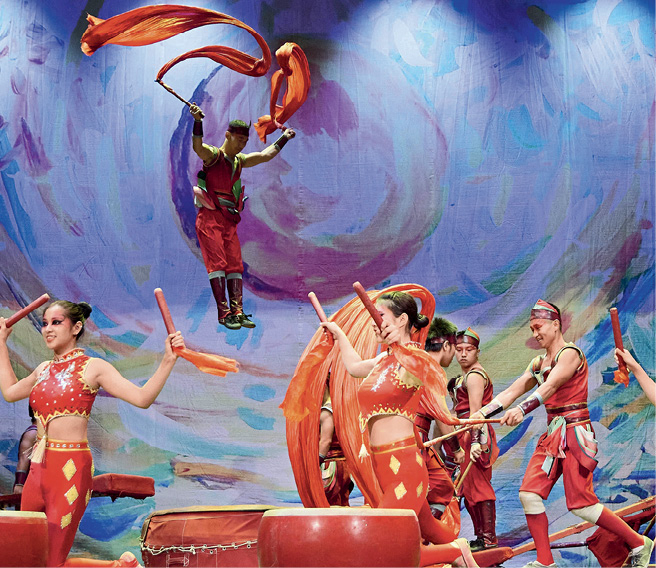The GCI stresses the importance of cultural exchanges, which has moved from the sideline to the center stage of international relations.
The Global Civilization Initiative (GCI) was first proposed by Chinese President and General Secretary of the Communist Party of China (CPC) Central Committee Xi Jinping in a speech he gave at the CPC in Dialogue with World Political Parties High-Level Meeting on March 15, 2023. “We advocate the common values of humanity... We advocate the importance of inheritance and innovation of civilizations... We advocate robust international people-to-people exchanges and cooperation,” President Xi said as he elaborated on the initiative. The GCI is another public good China has provided the world following the Global Development Initiative and the Global Security Initiative, and has been well received by the international community.

Lion Dance players interact with spectators before the Chinese New Year celebrations kick off at the Trafalgar Square in London, the U.K. on January 22, 2023.
GCI Boosts Inter-Civilization Exchanges and Mutual Learning
The GCI stresses the importance of cultural exchanges, an element which has moved from the sidelines to the center stage of international relations. The GCI provides guidance for exchanges and mutual learning of world civilizations, and injects vitality to the endeavor, thus having profound global significance.
First, the GCI boosts the development of global civilizations. In contrast to the dichotomous narrative of “democracy vs. autocracy” among certain people in the West, the GCI calls on all countries to uphold the principles of equality, mutual learning, dialogue, and inclusiveness among civilizations, to advocate the common values of humanity, respect the diversity of civilizations, and to refrain from imposing their own values or models on others or stoking ideological confrontation. As an alternative to the West-dominated narrative on values, it injects positive energy into the development of global civilizations.
Second, the GCI gives humanity more confidence in overcoming global challenges. Our world is facing a multitude of challenges, sluggish economic recovery, widening development divide, degrading environment, threatening pandemics, and die-hard cold war mentality, to name just a few. To tackle these problems, humanity needs both material means and a guiding beacon. In a time when countries around the world are more interconnected and interdependent than ever before, the GCI urges countries to let cultural exchanges transcend estrangement, mutual learning transcend clashes, and coexistence transcend feelings of superiority, so that peoples of all countries can work together to combat their common challenges.
Third, the GCI presents a new vision for humanity’s journey to modernization. Modernization is not “an exclusive patent” of a small handful of countries, nor is it a question with a single answer. It cannot be realized by a cookie-cutter approach. To realize modernization, a country should draw on the best elements of other civilizations while more importantly basing its development model on its own conditions instead of blindly imitating others. All countries should respect the diversity of global civilizations and development models, and refrain from imposing their models onto others.
Fourth, the GCI opens a new path toward the goal of building a community with a shared future for mankind. Together with the Global Development Initiative and the Global Security Initiative, the GCI lends strong momentum to efforts to build a community with a shared future for mankind. It enriches the practice to achieve this goal, and consolidates the cultural foundation for the modernization of human society.

The China National Acrobatic Troupe gives a performance at the EDP Gran Via Theater in Madrid, Spain on August 23, 2023.
Highlights of China-Europe Cultural Exchanges in 2023
During his visit to the EU headquarters in 2014, President Xi said that China and the EU should view their relationship from a strategic perspective, and pool the strengths of their respective markets and civilizations to foster China-EU partnerships of peace, growth, reform, and civilization. To achieve this goal, the two sides have since carried out cultural and people-to-people exchanges and cooperation that have delivered plentiful results.
Following the inauguration of the China-U.K. High-Level People-to-People Dialogue and China-EU High-Level People-to-People Dialogue in 2012, China launched similar dialogue mechanisms with France and Germany in 2014 and 2017, respectively. As the pandemic subsided, cultural and people-to-people exchanges between China and Europe have resumed, and all exchange programs have been proceeding smoothly.
Recently, there has been a steady increase in cultural exchanges between China and the U.K. In October 2022, the Chinese embassy in the U.K. hosted a photo exhibition “An Extraordinary Decade of China in the New Era,” which attracted members of political parties as well as people from other walks of life in the U.K. During their visit, the audience was impressed by the remarkable achievements Chinese people had made under the leadership of the CPC, and China’s progress in the fields of economy, environmental protection, technological innovation, public health, food security, and infrastructure. They thought highly of China’s contributions to global development.
On January 22, 2023, the Trafalgar Square in London was filled with celebrations for the Chinese New Year, which were the biggest outside Asia. The event, which has been held in the city for 22 consecutive years, has helped locals learn more about traditional Chinese culture, forge friendly ties between the peoples of China and the U.K., and boost healthy development of bilateral relations.
In January this year, “Botticelli to Van Gogh: Masterpieces from the National Gallery,” a special exhibition jointly presented by the Shanghai Museum and the National Gallery of the U.K., opened at the Shanghai Museum. Through the 52 art masterpieces by 50 of the best-known Western artists in the National Gallery’s collection, the exhibition introduces Chinese audiences to a concise history of European art from the Renaissance period to the impressionistic era of art in the late 19th century.
On February 16, 2023, the 73rd Berlin International Film Festival kicked off after a two-year lull during the pandemic. Chinese films entered the shortlist for the highly-anticipated Awards Competition, Awards Panorama, and Awards Encounters.
On June 12 this year, a Memorandum of Understanding (MOU) was signed to set up the Sino-German University of Science and Technology in Shanghai. The signing of this MOU is a move in response to the common industrial needs of the two countries by jointly exploring a model for high-quality engineering talent training. It also marks another important milestone of win-win cooperation in high education between China and Germany.
On April 5, 2023, the seventh Festival Croisements opened in Beijing. French President Emmanuel Macron delivered a speech at the opening ceremony, reiterating the importance of cultural links in bilateral relations and unveiling a number of exchange projects. Chinese President Xi Jinping announced that China will enhance cooperation with France in related fields, pointing to major events in the coming year – the Paris Olympic and Paralympic Games, the China-France Year of Culture and Tourism, and the 60th anniversary of diplomatic relations between the two countries.
This year marks the 50th anniversary of the establishment of diplomatic relations between China and Spain. According to the consensus reached between President Xi and Prime Minister Pedro Sánchez, 2023 is designated the China-Spain Year of Culture and Tourism, during which dozens of activities have been scheduled, covering performance art, visual art, cultural heritage, and tourism. Back in July of this year, the World Tourism Alliance and the Spanish Tourism Authority co-organized the “World Tourism Alliance Dialogue for China-Spain Tourism Cooperation,” in an effort to stimulate the recovery and growth of two-way tourism and visits.
This year, China has also hosted cultural events for the Chinese New Year, the Mid-Autumn Festival, and activities theming Chinese tea culture and promoting China tours. They all boost the exchanges and mutual learning between the Chinese and European people.

Crew members of the film The Shadowless Tower at a press conference during the 73rd Berlin International Film Festival at Grand Hyatt Hotel on February 18, 2023 in Berlin, Germany.
Problems and Challenges
Despite the tremendous contributions China has made to human progress, it is still often misunderstood or even demonized in the international community. Sino-European relations, especially their economic and trade ties, have grown closer in recent years, but at the same time, misgivings, misunderstandings, and negative sentiments toward China are on the rise in certain European countries. Some media outlets, think tanks, and politicians attack China on the issues of human rights, trade imbalance, aid to Africa, and the South China Sea dispute. Under these circumstances, Europe has moved a lot closer to the U.S. in how it works with China.
Certain Western media by intentionally covering only the negative stories of China while filtering out other aspects of the reality feed anti-China sentiment to their readers. This misrepresentation over many years has distorted China’s image among people in Europe, and impeded bilateral exchanges and cooperation. A recent survey of Pew Research Center shows that 85 percent of people in Switzerland have negative views of China, compared with 76 percent in Germany, 72 percent in France, and 69 percent in the U.K.
For Effective, Smooth Exchanges
To advance the GCI, promote bilateral exchange and mutual learning, and build a community with a shared future, China and Europe need to, first of all, increase trust, dispel doubt, and work for a relationship of higher quality.
First, the two sides should step up cultural exchanges to increase mutual trust. The diversity of civilizations is a reality and also an invaluable asset of all humanity. With marked differences in languages, cultural traditions, and ways of thinking, China and Europe need more cultural exchanges to help their people gain a better understanding of each other. As the representatives of the Oriental and Western civilizations, China and Europe have developed different values, arts and literature, and ideologies. Through exchanges, they can hold dialogues on issues of disagreement and compare notes on some hot spots and even sensitive topics, thus increasing mutual understanding.
Second, the two sides should increase people-to-people exchanges to reinforce friendship. Friendship, which is derived from close contact between peoples, holds the key to sound state-to-state relations. China and Europe should work together to unleash the full potential of all parties on both sides to increase contact between their peoples. Traditionally, government agencies have been the main force in China’s cultural exchanges with Europe, exhibiting a lack of synergy with the private sector, hindering as a result exchanges from achieving the best results possible. In the coming years, non-official organizations and private sectors should be motivated to play their due part in people-to-people exchanges between China and Europe. In addition, the two sides should dismantle the obstacles to personnel flow to facilitate exchanges between research institutes, schools, and businesses. 
DR. LI GANG is an associate researcher with Wenzhou University and professor of its Oujiang College.